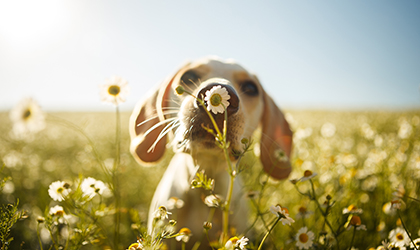
Nutrition Facts
When it comes to feeding your dog, reject the myths and turn to the hard-core, ironclad science to ensure he has the best diet possible. if you cut any of the following food groups from your dog’s dinner, you could unwittingly cause him more harm than good.
Did you know dogs’ possess the ability to make their own vitamin C? Pretty impressive, right? But thanks to poor modern day diets, your pooch will still benefit from a supplement to support his natural levels.
Water
Water makes up 70 to 80 per cent of your pooch’s body mass, so proper hydration is a must. H20 is responsible for regulating body temperature, flushing toxins from the body, transporting nutrients to cells, and hydrolysing protein, fat and carbohydrates for digestion (it really is the secret to optimal health, isn’t it?) Make sure your four-pawed friend has access to fresh water at all times, especially when eating.
Protein
Protein is a macronutrient, teeming with essential and non-essential amino acids, which are the basic building blocks of life. Proteins give the body structure (think strong muscles, bones, hair, skin and nails) and are vitally important for the production of enzymes, hormones, neurotransmitters and antibodies – chemicals that keep the body functioning optimally. Since your mutt cannot produce essential amino acids he needs a ready supply through diet. Animal sources (lean-muscle meats), fish and eggs all pack a powerful protein punch. Fancy adding some colour and spice to your furry friend’s humdrum diet? Why not try and make homemade pet food.
Fat
As another macronutrient, fat supplies the most concentrated source of energy, with twice as many calories as carbs and protein. It also enables the absorption of fat-soluble vitamins, provides essential fatty acids, protects internal organs, and promotes a healthy nervous system. Animal meat, along with vegetable and plant-based oils are excellent sources. Disclaimer: ensuring your pooch gets enough fat in his diet doesn’t mean you have a green card to feed him unhealthy table scraps. Yes, that takeaway is a big no-no.
Carbohydrates
High carbohydrate foods often supply more than just energy, they are often rich sources of vitamins and minerals. Keep paws away from high-glycaemic ‘junk’ carbohydrates though, as these will only spike blood sugar levels and leave your pet feeling fatigued. Instead, opt for dog-friendly vegetables such as carrots, cabbage, legumes and grains.
Vitamins
Just like humans, dogs need a range of fat-soluble (A, D, E and K) and water-soluble (B and C) vitamins for proper metabolic function. These essential nutrients play countless roles in the body such as supporting the immune system, serving as antioxidants, maintaining a healthy nervous system, and regulating calcium and phosphorus levels. Since your pooch can’t synthesize these nourishing nutrients in adequate quantities, they must come from dietary sources like vegetables and animal products or a high-strength multivitamin.
Minerals
Like vitamins, minerals perform all sorts of impressive marvels in the body. They provide antioxidant support, aid in nerve transmission, carry oxygen throughout the body, promote bone health, and support your dog’s skin and coat. Muscle and organ meat, fish and vegetables are jam-packed with our mineral friends’ iron, zinc, selenium, phosphorus, magnesium and calcium.
Diet Tips
-
Never feed hungry hounds from your plate or the table, as this will only encourage disobedient begging. And as the saying goes, ‘you can’t teach a new dog old tricks’.
-
Always feed large-breed dogs from raised bowls to prevent them from swallowing air, which could lead to uncomfortable bloating
-
Stand by the rule ‘nothing in life is free’ and always ask your furry friend to sit before feedings. This will fulfil his desire to ‘work’ for his food and reinforce good behaviour.
-
Once you’ve put down your dog’s dinner, leave him to eat in peace. Removing the bowl prematurely could incite distrust and aggression.
-
Never walk your dog immediately after feeding him since it could trigger a potentially fatal case of stomach bloating. Always give your dog at least an hour to digest his food.
-
Ensure your dog always has access to fresh, clean drinking water at meal times
You Might Also Like

Keri
Keri Filtness has worked in the Nutrition Industry for 19 years. She is regularly called upon for her professional comments on health and nutrition related news. Her opinions have been featured by BBC3, Prima, Vitality, The Mirror, Woman’s Own and Cycling Weekly, amongst others. She has also worked one to one with journalists, analysing their diets and health concerns and recommending changes and additions, where appropriate.
View More



